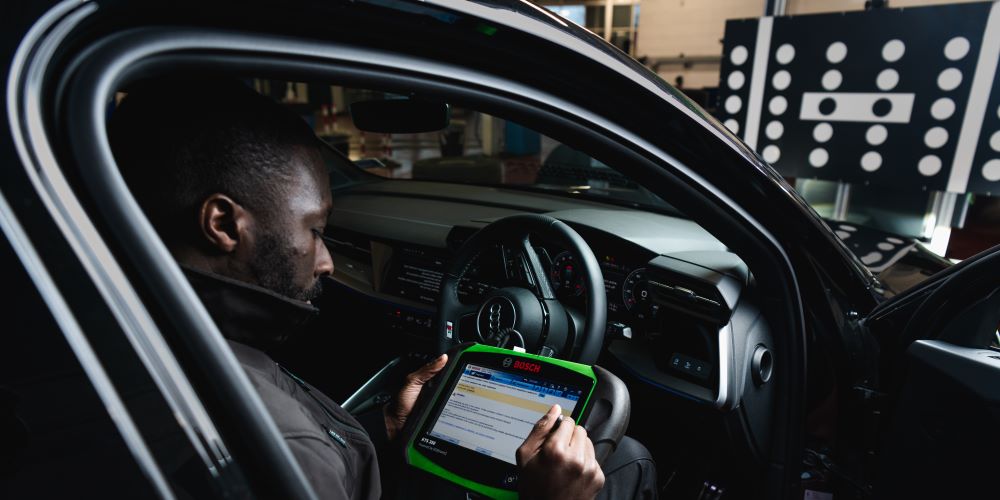ADAS Calibration
Advanced Driver Assistance Systems, or ADAS for short, is the collective name for a growing range of vehicle features that help boost car and driver safety. ADAS checks things such as braking, speed, and steering tasks, before either automatically taking action or sending an alert to the driver.
ADAS systems include (but are not limited to): Autonomous Emergency Braking, Lane Departure Warning, and Road Sign Detection — all of which use a series of cameras to detect the position of the vehicle and other road obstacles.
ADAS systems require regular recalibration after certain vehicle maintenance and repairs are carried out, in order to ensure they can continue to work effectively.
ADAS Calibration at Kwik Fit
Kwik Fit are proud to be able to offer ADAS calibration service at selected centres, where our equipment is capable of calibrating vehicles fitted with LiDAR/RADAR and camera detection. If you require ADAS calibration please contact your local centre to check if your vehicle is suitable.
Find your nearest Kwik Fit ADAS Calibration centre
Depending on the make and model of your car (and the ADAS technology installed), your vehicle may require a static or dynamic calibration.
1. Static ADAS Calibration
Static ADAS Calibration involves adjusting the various ADAS cameras and sensors whilst the vehicle is stationary. It must be performed in a controlled environment using specialist equipment. Many Kwik Fit centres are now fitted with such equipment.
What's involved in Static ADAS Calibration?
Static ADAS Calibrations start by establishing the vehicle thrust line, by checking the wheel alignment and making any necessary adjustments. Special aiming targets are then positioned relative to the thrust vector of the vehicle. The vehicle’s sensors are then calibrated to the correct position using diagnostic tools.
In some cases, these vehicles may require a confirmatory road test or dynamic follow-up calibration to ensure the sensors are operating correctly.
The map below shows all Kwik Fit locations where Static ADAS Calibration can be carried out.
2. Dynamic ADAS Calibration
Dynamic ADAS Calibration involves adjusting the sensors and cameras whilst the vehicle is in motion, i.e. during a road test. If your vehicle requires Dynamic ADAS Calibration, this can be completed at any Kwik Fit centre with Hunter alignment equipment installed.
What’s involved in Dynamic ADAS Calibration?
Dynamic ADAS Calibrations are carried out on the road by trained technicians where the vehicle is driven, usually for between 15 and 30 minutes, on relatively straight roads whilst maintaining an average speed, until the vehicle calibration is complete.
The locations on the map below can assist with Dynamic ADAS Calibration for your vehicle.
The locations on the map below can assist with Dynamic ADAS Calibration for your vehicle.
Does my vehicle need static or dynamic ADAS Calibration?
For information as to which type of calibration you require for your ADAS systems, refer to your vehicle handbook. If you are still unsure, speak to your local Kwik Fit centre who will be happy to assist.
Is ADAS calibration worth it?
ADAS calibration is absolutely worth it, to ensure the systems helping you stay safe on the road are accurate and functioning as they should. If you get your ADAS calibrated properly, there are also benefits for driving experience and car resale value, too.
How often should ADAS be calibrated?
You should get your ADAS calibrated whenever your car’s sensors are disrupted. This could be caused by a cracked windshield, damage from a collision or accident, or a routine procedure like wheel alignment.
How do I know if I need ADAS calibration?
You may need to get your ADAS sensors recalibrated if:
- You notice faulty alerts or errors in the sensors/detection (EG: lane assist triggering unnecessarily).
- You see ADAS-related warning lights on your dashboard.
- Your car has been involved in an accident or minor collision that could have damaged the ADAS sensors.
- You find physical damage to the bodywork of your car that impacts the sensors.
What happens if ADAS is not calibrated?
Without correct calibration, your ADAS systems are liable to malfunction or provide inaccurate warnings, which could compromise the safety of you and your passengers. Certain features like Lane Departure Warning, Adaptive Cruise Control, and Auto Emergency Braking may not work as intended in the absence of proper ADAS calibration, potentially increasing the risk of accidents.
What’s more, if your ADAS system fails to meet manufacturer standards, your insurance or warranty may be impacted too.

Can you recalibrate your own car?
Recalibrating your own car's ADAS is not only risky but incredibly difficult, and requires specialist equipment to be completed correctly. Unless you have the relevant equipment, training, and knowledge, like our Kwik Fit technicians, we strongly recommend taking your car to a specialist at an authorised centre to avoid any issues.
How much does it cost to calibrate ADAS?
The cost of an ADAS calibration largely depends on your vehicle’s make, model, and the specific type of ADAS technology it uses. For an accurate quote, get in touch with your local Kwik Fit directly.
How long does it take calibrate an ADAS system?
It can take anywhere from 30 minutes to 3 hours to successfully calibrate a car’s ADAS system.
- The variation in time taken to calibrate ADAS depends on the vehicle’s complexity and the type of calibration needed (static or dynamic).
- Generally speaking, static calibrations are quicker, taking closer to an hour, while dynamic ones require more elements and can take longer.
- There may also be specific manufacturer requirements that can alter times taken per vehicle, too.
Which Kwik Fit centres can carry out Static ADAS calibration?
The following list of centres all have the specialist equipment available to complete static ADAS Calibrations.
Segensworth Fareham Hampshire PO15 5SL
01489 589616






